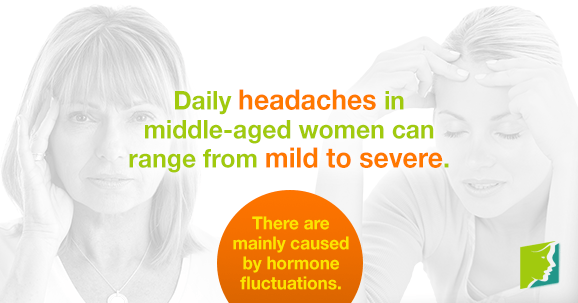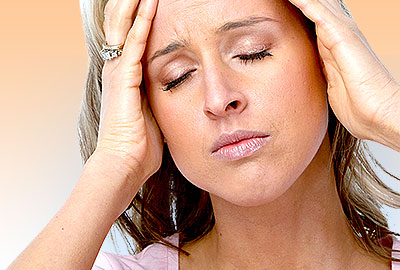Women are five times more likely to experience headaches than men, and are more susceptible to frequency and intensity of headaches as they approach menopause. This can be directly linked to the hormone fluctuations middle-aged women experience during the menopause transition. Headaches can range from mild, everyday tension headaches to unbearable migraines that can last several hours or days. It is important to understand the common triggers of headaches, as well as beneficial treatments for them.
Daily Headaches
Tension type headaches are the most common type of headaches. They are defined as the dull, daily headaches that typically do not last more than a few hours. Migraine headaches are much more intense, and are characterized by a recurrent, throbbing pain that starts on one side of the head. Migraines are usually accompanied by nausea, and can last anywhere from a few hours to a few days.
Hormone fluctuations are the primary cause of daily headaches among middle-aged women. Essentially, the hormone called estrogen causes blood vessels to dilate, and progesterone makes them constrict. When hormones fluctuate, it results in intense pain because they are constantly expanding and contracting.
There are additional common triggers for daily headaches in middle-aged women, including: excessive alcohol or caffeine consumption, lack of sleep, skipping meals, dehydration, high stress, lack of exercise, and poor diet.
Managing
There are several effective ways to relieve daily headaches. Making simple lifestyle changes, like getting sufficient amounts of sleep, maintaining a balanced diet, and getting plenty of exercise. These lifestyle changes can be very beneficial in preventing headaches and other bothersome menopausal symptoms.
The general recommendation eat small, healthy meals and snacks every three to four hours to maintain blood sugar levels in order to prevent daily headaches. Exercising regularly (at least three times a week) is important for overall health, as well as reducing stress, and boosting energy levels. Yoga, swimming, cycling, and walking are excellent low-impact aerobic activities that can help relieve daily headaches.
Dehydration is a common cause of headaches, so it is vital to drink plenty of water throughout the day, as well as avoid excessive amounts of alcohol and caffeine.
If headache pain persists or worsens, it may be helpful to try over the counter medicine like aspirin, ibuprofen, or acetaminophen. These drugs are meant to stop the headache in progress, and are also referred to as “acute treatment”. If these over the counter medications are not strong enough, talk to your doctor about prescription pain killers.
Daily headaches in middle-aged women can range from mild to severe, and can interfere with daily life and the ability to carry out activities. Daily headaches are mainly caused by hormone fluctuations, making women more vulnerable to them during menopause when hormones are in flux. Read more about the several ways to treat menopausal headaches.
Sources
- National Health Service Choices.(2013)"Hormone Headaches." Retrieved on August 6, 2014 from http://www.nhs.uk/livewell/headaches/pages/hormonalheadaches.aspx




